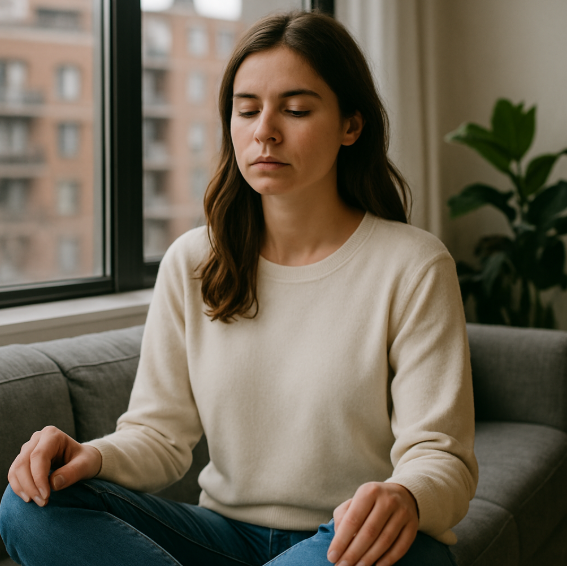Table of Contents
The Kind of Anxiety I Didn’t See Coming
I used to think I knew what anxiety felt like. For me, it was the sweaty palms before a job interview or the racing thoughts the night before an exam. Temporary. Predictable. Something I could push through.
But these days, anxiety has taken on a different shape. It isn’t just those obvious moments anymore. It’s lying awake at 2 a.m. replaying conversations I had earlier that day. It’s my chest tightening when I scroll through the news. It’s the nagging feeling that I’ve forgotten something, even when my to-do list is complete.
What’s strange is that so many people I know are feeling it too. Friends who’ve never described themselves as “anxious” are suddenly saying, “I can’t focus,” or “I feel on edge all the time.” Anxiety in 2025 doesn’t always show up like panic it’s quieter, heavier, and harder to shake.
Talking About It Without Pretending
One of the biggest shifts I’ve noticed is how much more open people are about talking about anxiety. Not in a self-help-book kind of way, but in raw, everyday conversations.
A friend recently admitted, “I wake up tired no matter how much I sleep. My brain just doesn’t stop.” Another told me, “I feel like I’m buzzing all the time, but not in a good way.” Hearing them be so honest gave me permission to be honest too.
I used to downplay my own feelings “I’m just tired,” or “It’s just stress.” But now, I try to say it out loud: I’m anxious today. And you know what? Most of the time, people respond with, “Me too.” That simple exchange makes me feel a little less trapped inside my head.
The Little Adjustments That Help
Coping hasn’t looked like some dramatic lifestyle overhaul for me. It’s been small, imperfect changes that give me breathing room.
Like mornings. I used to grab my phone the second I opened my eyes. Within minutes, I’d be bombarded with emails, news, and a feed full of other people’s lives. My anxiety would be off the charts before I’d even had breakfast.
Now, I try to wait. I make tea, sit by the window, and just exist for a few minutes before I dive into the digital noise. It sounds almost too simple, but starting my day without an immediate adrenaline rush makes the rest of the day more manageable.
Another thing I’ve leaned on is walking. Not the “10,000 steps a day” kind of walking, but slow, head-clearing walks when my thoughts feel tangled. Sometimes I put on calming music, sometimes I just listen to the sound of my feet on the pavement. It doesn’t cure anxiety, but it shifts it into the background.
When Movement Calms the Mind
I never used to connect exercise with anxiety. In fact, when I was overwhelmed, the last thing I wanted to do was work out. But I realized I didn’t need intense gym sessions.
Some days, stretching on the floor is enough. Other days, a bit of yoga or dancing around my room helps release the tension that builds up in my body. Movement doesn’t erase anxious thoughts, but it makes me feel less trapped by them.
There’s something powerful about reminding myself: I can still move. I can still breathe. Even when my mind is restless, my body can find rhythm and that anchors me.
Setting Boundaries That Stick
Part of my anxiety comes from the feeling of being constantly “on.” Messages, emails, notifications it’s endless. For the longest time, I thought I had to respond right away to everyone, about everything. That pressure ate me alive.
Lately, I’ve been setting boundaries. Silencing notifications at night. Logging off when work is done. Telling myself that not every message deserves an instant reply.
At first, it felt selfish. But the relief of creating space for myself has been worth it. Most people understand. And the ones who don’t? Well, I’ve learned that my peace matters more.
The Guilt of Saying “No”
Here’s something I’ve struggled with: saying no. Anxiety convinces me that if I say no to a social event, to extra work, to helping out I’m letting people down. So I pile on commitments until I’m overwhelmed.
The turning point for me was realizing that “no” doesn’t mean I don’t care. It means I’m human. It means I have limits. And respecting those limits actually makes me a better friend, coworker, and person because I’m not running on empty.
It’s still hard, but every time I practice saying no without guilt, my anxiety loosens its grip just a little.
Finding Calm in Routines
There’s something about simple routines that feels like medicine for my anxiety. Not rigid schedules, but little anchors throughout the day. Lighting a candle while I work. Journaling a few lines before bed. Making the same cup of tea every evening.
These things don’t solve my problems, but they remind me that not everything has to be chaotic. Even small moments of predictability help me breathe a little deeper.
Reaching Out Instead of Retreating
My instinct when I feel anxious is to withdraw. To hide it, deal with it quietly, and hope it passes. But I’ve learned that reaching out even with something as small as “Hey, today feels heavy” makes a huge difference.
Sometimes all I need is a friend to say, “I get it.” Other times, I need real guidance from a professional. Either way, opening that door makes the anxiety feel less suffocating. It’s a reminder that I don’t have to carry it alone.
Giving Myself Permission to Rest
This might be the hardest one. Anxiety makes me feel like I have to keep moving, keep proving myself, keep doing. Rest feels like laziness, and guilt creeps in whenever I try to slow down.
But here’s the truth I’m learning: rest isn’t failure. It’s fuel. Some of my most anxious days have been turned around by a nap, a quiet evening, or letting myself off the hook for not being productive.
The world already demands so much from us. Giving myself permission to rest is one of the most radical, healing things I can do.
Anxiety Feels Different—But So Does Coping
Anxiety in 2025 feels less like an occasional storm and more like a steady drizzle that never fully stops. But I’m learning to live with it, not by ignoring it, but by finding small, practical ways to cope.
It’s morning tea instead of morning chaos. It’s walking when my thoughts feel tangled. It’s saying no when I need to. It’s being honest when I feel heavy. None of these things erase anxiety but they make it lighter, easier to carry.
And maybe that’s the point. Maybe coping isn’t about eliminating anxiety altogether, but about creating enough space to breathe, to move, to rest, and to remind ourselves that we’re not alone in this.



